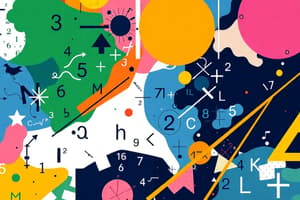Podcast
Questions and Answers
What are the basic operations involved in arithmetic?
What are the basic operations involved in arithmetic?
The basic operations involved in arithmetic are addition, subtraction, multiplication, and division.
How does algebra differ from arithmetic?
How does algebra differ from arithmetic?
Algebra uses variables to represent unknown quantities, while arithmetic focuses on numerical calculations.
What is the primary focus of geometry?
What is the primary focus of geometry?
The primary focus of geometry is the study of shapes, sizes, and positions of figures in space.
What are the main concepts dealt with in calculus?
What are the main concepts dealt with in calculus?
What does statistics involve in terms of data?
What does statistics involve in terms of data?
Flashcards
Mathematics
Mathematics
The study of quantity, structure, space, and change using abstract symbols and logical reasoning.
Arithmetic
Arithmetic
Basic math operations (add, subtract, multiply, divide) and number properties.
Algebra
Algebra
Using variables to represent unknowns and solve equations.
Calculus
Calculus
Signup and view all the flashcards
Geometry
Geometry
Signup and view all the flashcards
Study Notes
Fundamental Concepts
- Mathematics is the study of quantity, structure, space, and change.
- It uses abstract symbols and logical reasoning to formulate and solve problems.
- Key branches of mathematics include arithmetic, algebra, geometry, calculus, and statistics.
- Mathematics is a fundamental tool in science, engineering, computer science, and many other fields.
Arithmetic
- Arithmetic deals with basic operations: addition, subtraction, multiplication, and division.
- It forms the foundation for more advanced mathematical concepts.
- Whole numbers, integers, fractions, and decimals are fundamental concepts in arithmetic.
- Properties of numbers, such as the commutative, associative, and distributive properties, are used to simplify calculations.
Algebra
- Algebra uses variables (letters) to represent unknown quantities.
- It provides a systematic way to solve equations and inequalities.
- Algebraic expressions, equations, and inequalities are studied.
- Algebraic manipulation techniques are essential for solving problems.
- Different types of equations are covered, such as linear equations, quadratic equations, and systems of equations.
Geometry
- Geometry studies shapes, sizes, and positions of figures in space.
- Basic shapes like triangles, squares, circles, and cubes are examined.
- Concepts like congruence, similarity, and area are also studied.
- Different types of geometry exist, including Euclidean geometry, non-Euclidean geometry.
- Geometric figures and their properties are an integral part of the subject.
- Coordinate geometry explores the relationship between geometry and algebra using coordinates.
Calculus
- Calculus is a branch of mathematics that deals with continuous change.
- It involves concepts of limits, derivatives, and integrals.
- Differentiation (finding the rate of change) and integration (finding the area under a curve) are core to calculus.
- Applications of calculus are vast, covering areas such as physics, engineering, and economics.
- Limits, derivatives, and integrals play a central role in solving problems in calculus.
- Techniques like the chain rule, product rule, and quotient rule are crucial in differentiation.
- Various integration techniques like substitution and integration by parts are employed.
Statistics
- Statistics deals with collecting, organizing, analyzing, interpreting, and presenting data.
- It involves using mathematical methods to draw conclusions from data.
- Descriptive statistics summarizes and describes data.
- Inferential statistics draws conclusions about a population based on a sample.
- Data collection, representation (using graphs and tables), and analysis are crucial.
- Probability is a fundamental component of statistics, allowing predictions based on data.
- Key concepts include measures of central tendency (mean, median, mode), variability (standard deviation, variance).
Sets
- A set is a collection of distinct objects, which could be numbers, variables, or anything else.
- Set theory provides a formal framework to study mathematical objects.
- Concepts of union, intersection, and complements of sets.
- Subsets and supersets are also explored.
- Cardinality (size) of a set and set operations are essential topics.
Discrete Mathematics
- Discrete mathematics deals with countable objects.
- It includes topics like logic, counting principles, graph theory, and recurrence relations.
- Logic is crucial in mathematics and computer science, formalizing reasoning.
- Combinatorics (counting) and graph theory (networks and relationships) are important areas.
Other Important Concepts
- Functions: Mapping inputs to outputs
- Sequences: Ordered lists of numbers
- Series: Sum of sequences
- Vectors: Quantities with magnitude and direction
Studying That Suits You
Use AI to generate personalized quizzes and flashcards to suit your learning preferences.
Description
Explore the essential branches of mathematics including arithmetic and algebra. This quiz will test your understanding of basic operations, properties of numbers, and the use of variables in solving equations. Get ready to reinforce your knowledge in these fundamental concepts!





